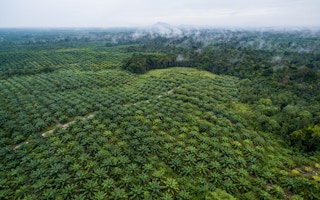Business is facing multiple disruptions at once—and the palm oil industry is no different. The Covid-19 crisis, climate change and nature loss bring particular material risk for the palm oil industry.
The production of palm oil requires healthy biodiversity, a stable climate and a reliable and clean water supply, but many current approaches are causing harm to the very resources the industry relies on.
It is therefore in the interest of all companies across the palm oil industry to ensure they are growing, processing and distributing this important raw ingredient in a way that helps protect and restore nature, rather than destroy it. Currently, nature loss is seen as one of the top global threats, alongside climate change.
“
The Science Based Targets Network builds on the concept of science-based targets for climate and is developing corporate targets for land, biodiversity, water and ocean.
Those palm oil companies that take steps now to start tackling their own impacts and dependencies on nature in line with science will be better placed to attract investment, reduce regulatory risk and increase customers.
Business is responsible for the majority of the world’s greenhouse gas emissions. Increasingly, companies are adapting and innovating to find new, low-carbon ways of working.
At the time of writing, over 1200 companies are committed to setting science-based targets for climate because these are the best ways of ensuring your company is doing enough on climate and adjusting your business accordingly.
Climate science-based targets give companies a clearly-defined pathway to understand how much and how quickly they need to reduce their emissions in line with the Paris Agreement goals. And these targets work.
Companies with science-based targets have reduced their combined emissions by 25 per cent since 2015, compared to an increase of 3.4 per cent in global emissions from energy and industrial processes over the same period. They’re also good for business.
52 per cent of executives said their science-based targets had helped attract more investment. More broadly, companies with strong ESG (Environment, Social and Governance) ratings tend to outperform their peers.
Now business needs to address nature loss as well as climate change. Science tells us that nature loss is as much of a threat to our lives and economies as climate change and that in fact, the two issues are deeply interlinked.
We cannot stop climate change without protecting and restoring nature. In addition, we need to address social inequalities if we are to successfully build the healthy, stable future humanity needs to survive—one where we have halted climate change and restored nature.
As nature is the source of all the raw materials that humans need to survive and business needs to operate, investors are increasingly taking note of nature-related risk in their portfolios. Investor groups like UN-PRI, Ceres and others are already working with us and the first financial institution—the Church of England Commissioners with assets under management of £8.7 billion has joined our Corporate Engagement Program.
Harry Ashman, Engagement Analyst of the Church Commissioners for England said in a statement, “Having committed to managing a net-zero emissions portfolio by 2050, we must also tackle nature loss in a meaningful way. We encourage other investors to join us in supporting the development of science-based targets for nature to facilitate improved management of our holdings’ impacts and dependencies on natural resources and systems. As exploitation of the natural world continues, and the scale of dependencies and damage become clear, regulatory, public and investor pressure will only increase. We urge companies to start understanding their reliance on nature now, in preparation for setting science-based targets for nature.”
Nature-related regulation is also on the rise with the EU, US, Singapore and Japan already making strong commitments to nature and calling for science-based action from companies. Forward-thinking companies would do well to get ahead of it and start now on their journey to setting science-based targets.
And the growth of increasingly conscious consumers means that consumer brands and retailers are also paying more attention to what their suppliers are doing in relation to nature in order to meet their customers’ changing priorities. Companies like Nestle, Carrefour and others have already joined our Program.
Owen Bethell, senior manager of environmental impact and global public affairs of Nestle said, “Working with the Science Based Targets Network on framing the challenges of nature loss helps us follow a highly credible approach backed by world-class science. For Nestlé, we know that by proceeding in this way, we are working with the right level of ambition to contribute to a nature positive future.”
Alongside these trends, business membership organisations like the World Business Council for Sustainable Development (WBCSD) are putting nature centre stage, making it now one of the membership criteria for companies to be pursuing science-based targets for nature.
The Science Based Targets Network builds on the concept of science-based targets for climate and is developing corporate targets for land, biodiversity, water and ocean. We encourage companies in the palm oil industry to start now to get ready for setting these targets by assessing their impacts and dependencies on nature right across their value chains.
Those that want to help co-design the targets can also join our Corporate Engagement Program. The program comes with guidance and support, as well as the opportunity to help road-test the methodologies as we develop to help ensure they are as impactful, cost-effective and easy-to-implement as possible.
Targets are being designed to be as efficient as possible and capitalise on companies’ existing efforts to reduce their impacts and dependencies on water, land, ocean and biodiversity as well as cutting their greenhouse gas emissions. They also align with global frameworks like the sustainable development goals (SDGs).
The intention is to build on the many initiatives out there and to give business one set of targets to bring it all together, making it easier to communicate what they’re doing to investors, customers and other stakeholders.
Companies that start their journey now to setting science-based targets for nature will become more resilient and prepared to weather the storms of the disruptive decade ahead, ready to thrive in the equitable, net-zero and nature positive future.
Businesses that bring their ingenuity and resourcefulness to help reinvent our economic systems as ones that work with, rather than against, nature, will be the ones that succeed.
Erin Billman is Executive Director of Science Based Targets Network. To find out more, watch the webinar for South East Asian companies here.


















